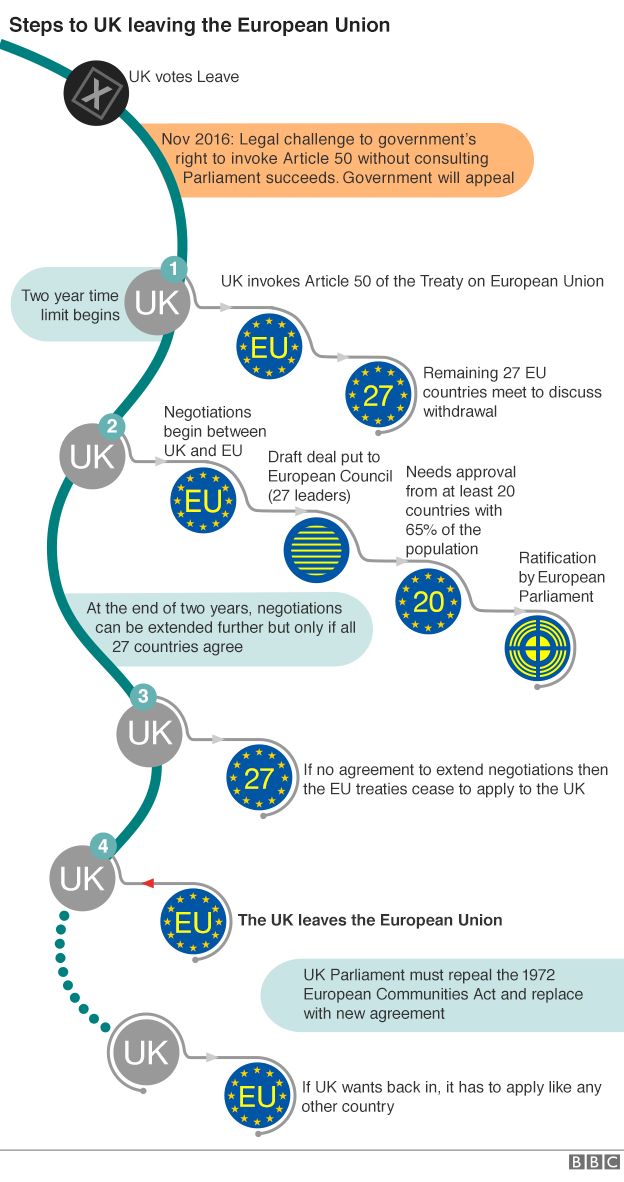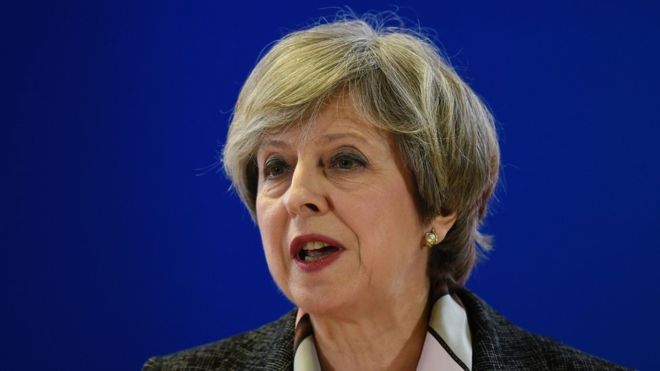Prime Minister Theresa May is to officially notify the European Union next Wednesday that the UK is leaving.
Downing Street said she would write a letter to the European Council, adding that it hoped negotiations on the terms of exit and future relations could then begin as quickly as possible.
The move comes nine months after a referendum in which the UK voted to leave by a margin of 51.9% to 48.1%.
An EU spokesman said it was “ready and waiting” for the letter.
Under the Article 50 process, talks on the terms of exit and future relations are not allowed until the UK formally tells the EU it is leaving.
If all goes according to the two year negotiations allowed for in the official timetable, Brexit should happen in March 2019.
A No 10 spokesman said the UK’s Ambassador to the EU, Sir Tim Barrow, informed the European Council, headed by President Donald Tusk, earlier on Monday of the date that Article 50 would be triggered.
Mrs May is expected to make a statement to the House of Commons on Wednesday shortly after invoking Article 50, setting out her aims.
A spokesman said the government wants negotiations to start as soon as possible but added that they “fully appreciate it is right that the other 27 EU states have time to agree their position”.
The BBC’s Ben Wright said he expected the Article 50 letter to be short, possibly extending to two pages at most, and for Mrs May to use it to publicly reiterate her general objectives – such as leaving the single market but reaching a mutually beneficial agreement on trade and other issues.
‘Clear aims’
At the same Downing Street briefing for reporters on Monday a spokesman also dismissed suggestions of an early general election, saying: “It’s not going to happen.”
Speaking in Swansea on Monday, during the first of a series of visits around the UK before she triggers Article 50, Mrs May said she was intent on “delivering on Brexit and getting the right deal”.
Last year’s referendum result, she added, “was not just about leaving the EU” but was a vote for a “change in the way the country works”.
“Part of that is building a strong economy and ensuring that the benefits of economic growth and prosperity are felt across every part of the UK.”

Brexit Secretary David Davis said the UK was now “on the threshold of the most important negotiation for this country for a generation”.
“The government is clear in its aims,” he said. “A deal that works for every nation and region of the UK and indeed for all of Europe – a new, positive partnership between the UK and our friends and allies in the European Union.”
In response to the news, Mr Tusk tweeted: “Within 48 hours of the UK triggering Article 50, I will present the draft Brexit guidelines to the EU27 Member States.”
Mr Tusk has previously said he expects to call an extraordinary summit of the 27 other members within four to six weeks, to draw up a mandate for the European Commission’s chief negotiator, Michel Barnier. Under this scenario, talks are likely to begin in earnest in May.
Mrs May said last year that she intended to notify the EU of the UK’s intention to leave by the end of March. The move was approved by Parliament two weeks ago when peers and MPs passed unchanged a bill giving the prime minister the authority to set the process in motion.
‘Extreme and divisive’
EU leaders have said they want to conclude the talks within 18 months to allow the terms of the UK’s exit to be ratified by the UK Parliament and the European Parliament, as well as approved by the necessary majority of EU states.
Mrs May has said MPs and peers will have a vote on the deal she negotiates but she has insisted the UK will leave anyway even if Parliament rejects it. The government has said it expects to secure a positive outcome but made clear there is a chance of there being no formal agreement.
Lib Dem leader Tim Farron, who has called for the public to have their say on the terms of exit in a further referendum, said Mrs May’s decision to rule out membership of the single market before negotiations began was proof she was pursuing an “extreme and divisive” Brexit.
“On the day Theresa May is travelling the country claiming she wants to bring the UK together, she lets it be known she is about to unleash division and bitterness,” he said.
“Leaving the single market was not on the ballot paper in the referendum, it is a political choice made by Theresa May.”
Later this week, EU leaders will gather in Rome to mark the 60th anniversary of the Treaties of Rome, which established the European Economic Community – the initial forerunner to the EU. Mrs May is not attending the event.
Source: BBC


